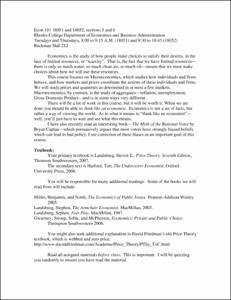Please use this identifier to cite or link to this item:
http://hdl.handle.net/10267/11354Full metadata record
| DC Field | Value | Language |
|---|---|---|
| dc.contributor.author | Hammock, Michael R. | - |
| dc.date.accessioned | 2011-11-08T19:36:29Z | - |
| dc.date.available | 2011-11-08T19:36:29Z | - |
| dc.date.issued | 2007-08-22 | - |
| dc.identifier.uri | http://hdl.handle.net/10267/11354 | - |
| dc.description | This syllabus was submitted to the Rhodes College Office of Academic Affairs by the course instructor. | en_US |
| dc.description.abstract | Economics is the study of how people make choices to satisfy their desires, in the face of limited resources, or “scarcity”. That is, the fact that we have limited resources— there is only so much water, so much clean air, so much oil—means that we must make choices about how we will use these resources. This course focuses on Microeconomics, which studies how individuals and firms behave, and how markets and prices coordinate the actions of these individuals and firms. We will study prices and quantities as determined in at most a few markets. Macroeconomics, by contrast, is the study of aggregates—inflation, unemployment, Gross Domestic Product—and is in some ways very different. There will be a lot of work in this course, but it will be worth it. When we are done you should be able to think like an economist. Economics is not a set of facts, but rather a way of viewing the world. As to what it means to “think like an economist”— well, you’ll just have to wait and see what this means. I have also recently read an interesting book—The Myth of the Rational Voter by Bryan Caplan—which persuasively argues that most voters have strongly biased beliefs, which can lead to bad policy. I see correction of these biases as an important goal of this course. | en_US |
| dc.language.iso | en_US | en_US |
| dc.publisher | Memphis, Tenn. : Rhodes College | en_US |
| dc.relation.ispartofseries | CRN Syllabi;18051 | - |
| dc.rights | Rhodes College owns the rights to the digital objects in this collection. Objects are made available for educational use only and may not be used for any non-educational or commercial purpose. Approved educational uses include private research and scholarship, teaching, and student projects. For additional information please contact archives@rhodes.edu. Fees may apply. | - |
| dc.subject | Syllabus | en_US |
| dc.subject | Curriculum | en_US |
| dc.subject | Economics, Department of | en_US |
| dc.subject | Academic departments | en_US |
| dc.subject | Text | en_US |
| dc.subject | 2007 Fall | en_US |
| dc.title | ECON 101-05, Introduction to Economics, Fall 2007 | en_US |
| dc.type | Syllabus | en_US |
| Appears in Collections: | Course Syllabi | |
Files in This Item:
| File | Description | Size | Format | |
|---|---|---|---|---|
| 2007_fall_ECON_101-05_18051.pdf | 26.12 kB | Adobe PDF |  View/Open |
Items in DSpace are protected by copyright, with all rights reserved, unless otherwise indicated.